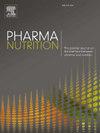FucoVital®抑制体外肝细胞中的脂肪酸积累,降低NAFLD患者的甘油三酯水平
IF 2.4
Q3 NUTRITION & DIETETICS
引用次数: 0
摘要
褐藻黄质(FX)是一种主要存在于褐藻和硅藻中的类胡萝卜素,已显示出在解决肥胖和代谢综合征(包括非酒精性脂肪性肝病(NAFLD))危险因素方面的潜力。FucoVital®是一种微藻衍生的FX,提供了一种清洁、高质量的海藻源替代品。首先,本研究旨在评估FucoVital®与商业FX产品和水飞蓟素(一种潜在的肝保护剂)在体外脂肪肝模型中的有效性。其次,该研究在一项NAFLD患者的前瞻性临床试验中评估了FucoVital®消费对生化指标的影响。方法采用不同浓度的FucoVital®、FX和水飞蓟素处理人肝HepG2细胞,建立体外脂肪肝模型。在临床试验中,32名成年NAFLD患者随机接受FucoVital®或安慰剂治疗12周,随后是FucoVital®的开放标签期。主要终点是肝酶水平的变化,而次要终点包括脂质谱、葡萄糖和炎症标志物。结果FucoVital®在体外显著抑制脂肪酸积累,优于商业FX和水飞蓟素。在临床研究中,与安慰剂相比,FucoVital®没有达到降低肝酶水平的主要终点。然而,它显著降低了甘油三酯水平(-16.33 mg/dl vs +19.81 mg/dl; = 0.031页)。胰岛素和血糖水平的改善也没有明显的趋势。结论fucovital®能有效抑制体外脂肪酸积累。虽然在临床试验中它没有改善肝酶,但它显著降低了甘油三酯水平,并显示出更好的血糖和胰岛素调节趋势。这些发现表明FucoVital®可能对代谢综合征患者有益。需要在更大和更多样化的人群中进行进一步的研究,以更好地了解其对人类肝脏健康的代谢作用和作用机制。本文章由计算机程序翻译,如有差异,请以英文原文为准。
FucoVital® inhibits fatty acid accumulation in liver cells in vitro and reduces triglycerides levels in patients with NAFLD
Background
Fucoxanthin (FX), a carotenoid primarily found in brown seaweed and diatoms, has shown potential in addressing obesity and risk factors of metabolic syndrome, including non-alcoholic fatty liver disease (NAFLD). FucoVital®, a microalgae-derived FX, offers a clean and high-quality alternative to seaweed-based sources.
Objective
First, this study aimed to evaluate the effectiveness of FucoVital® compared to a commercial FX product and Silymarin, a potential hepato-protective agent, in an in vitro fatty liver model. Second, the study assessed the impact of FucoVital® consumption on biochemical markers in a prospective clinical trial of NAFLD patients.
Methods
An in vitro fatty liver model was created using human hepatic HepG2 cells, which were treated with varying concentrations of FucoVital®, commercial FX, and Silymarin. In the clinical trial, 32 adults with NAFLD were randomized to receive either FucoVital® or placebo for 12 weeks, followed by an open-label phase with FucoVital®. The primary endpoint was changes in liver enzyme levels, while secondary endpoints included lipid profiles, glucose, and inflammatory markers.
Results
In vitro, FucoVital® significantly inhibited fatty acid accumulation, outperforming both commercial FX and Silymarin. In the clinical study, FucoVital® did not achieve the primary endpoint of reducing liver enzyme levels compared to placebo. However, it significantly reduced triglyceride levels (-16.33 mg/dl vs. +19.81 mg/dl; p = 0.031). Non-significant trends toward improved insulin and glucose levels were also observed.
Conclusion
FucoVital® effectively inhibited fatty acid accumulation in vitro. While it did not improve liver enzymes in the clinical trial, it significantly reduced triglyceride levels and showed trends toward better glucose and insulin regulation. These findings suggest FucoVital® may benefit patients with metabolic syndrome. Further studies are needed in larger and more diverse populations to better understand its metabolic effects and mechanisms of action in human liver health.
求助全文
通过发布文献求助,成功后即可免费获取论文全文。
去求助
来源期刊

PharmaNutrition
Agricultural and Biological Sciences-Food Science
CiteScore
5.70
自引率
3.10%
发文量
33
审稿时长
12 days
 求助内容:
求助内容: 应助结果提醒方式:
应助结果提醒方式:


